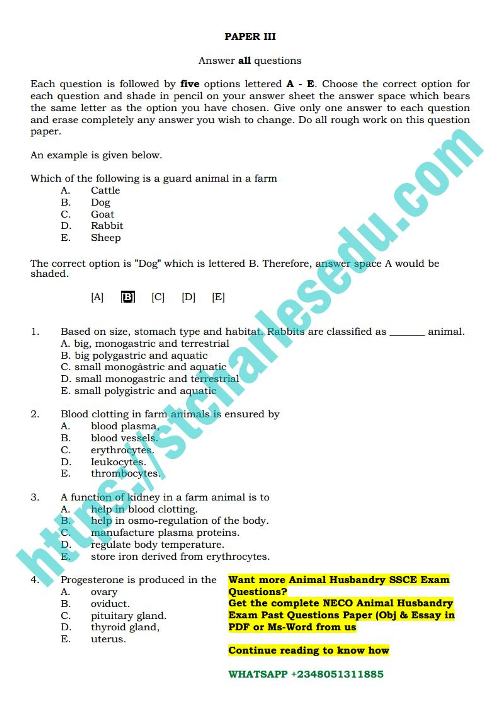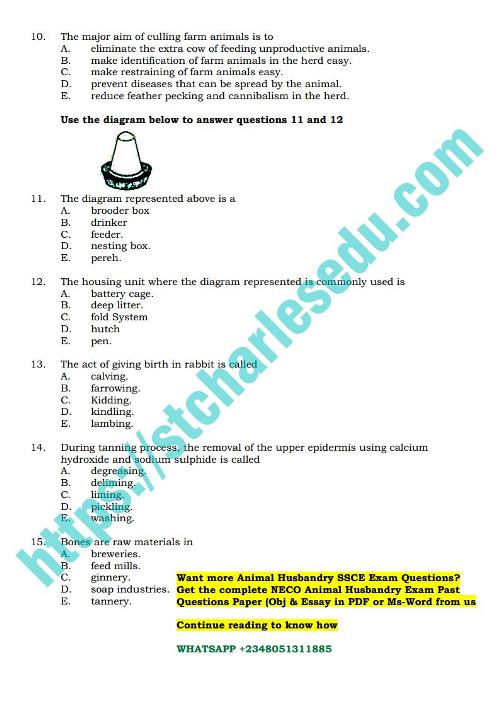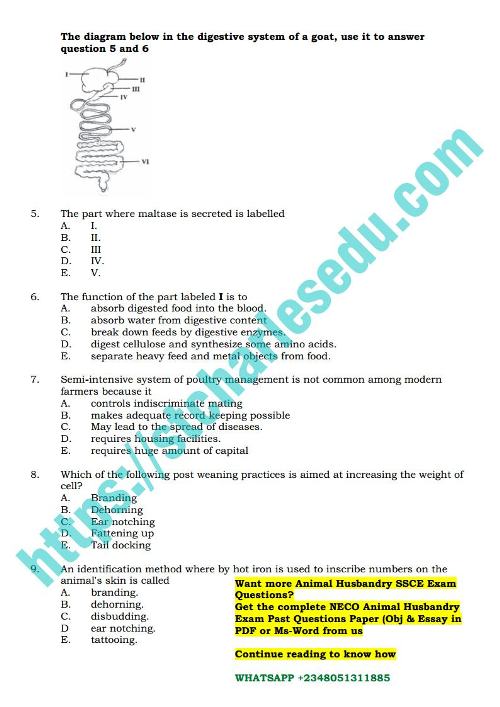Are you writing the National Examination Council NECO Internal/External examination, if yes you need the NECO Animal Husbandry Past Questions in 2022
we at stcharlesedu.com has compiled a good number of SSCE NECO Animal Husbandry Past Questions in Pdf
Animal Husbandry Paper 1 – Practical
Animal Husbandry Paper 2 – Theory/Essay Questions.
Animal Husbandry Paper 3 – Objective Test Questions.
Our research has confirm that candidate that uses National Examination Council NECO Past Question on Animal Husbandry to prepared for their up coming exam are ten times better than those who do not.
What others are downloading
WAEC Past Questions for all Subjects
NECO Past Questions for all Subjects
WAEC Anim Husb Past Questions
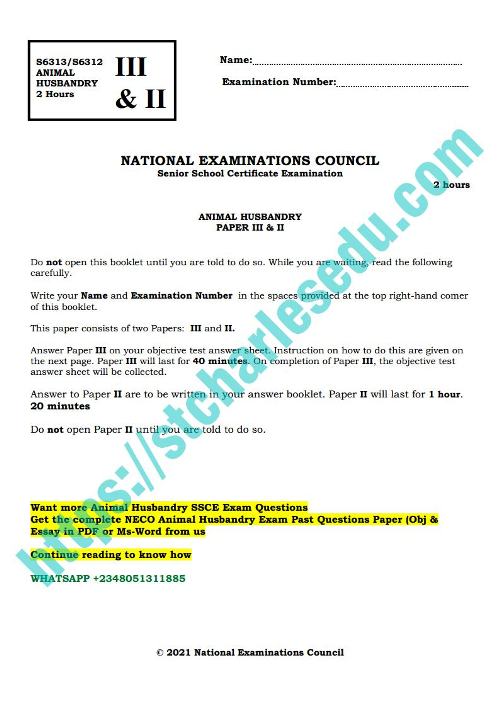
Table of Contents [hide]
Animal Husbandry Past Questions for NECO
PAPER III
Answer all questions.
Each question is followed by five options lettered A – E. Choose the correct option for each question and shade in pencil on your answer sheet, the answer space that bears the same letter as the option you have chosen. Give only one answer to each question and erase completely any answer you wish to change. Do all your rough work on this question paper.
An example is given below.
Which of the following is a guard animal in a farm
A. Cattle
B. Dog
C. Goat
D. Rabbit
E. Sheep
The correct option is “Dog” which is lettered A. Therefore, answer space A would be shaded.
[A] [B] [C] [D] [E]
NECO Anim. Husbandry Objective Questions
1.Based on size, stomach type and habitat. Rabbits are classified as _ animal.
A. big, monogastric and terrestrial
B. big polygastric and aquatic
C. small monogâstric and aquatic
D. small monogastric and terrestrial
E. small polygistric and aquatic
2. Blood clotting in farm animals is ensured by
A. blood plasma,
B. blood vessels.
C. erythrocytes.
D. Leukocytes.
E. thrombocytes.
3. A function of kidney in a farm animal is to
A. help in blood clotting.
B. help in osmo-regulation of the body.
C. manufacture plasma proteins.
D. regulate body temperature.
E. store iron derived from erythrocytes.
4. Progesterone is produced in the
A. ovary
B. oviduct.
C. pituitary gland.
D. thyroid gland,
E. uterus.
The diagram below in the digestive system of a goat, use it to answer question 5 and 6
[Download the free Anim. Husb NECO past questions in pdf below to see IMAGE]
5. The part where maltase is secreted is labelled
A. I.
B. II.
C. III
D. IV.
E. V.
6. The function of the part labeled I is to
A. absorb digested food into the blood.
B. absorb water from digestive content
C. break down feeds by digestive enzymes.
D. digest cellulose and synthesize some amino acids.
E. separate heavy feed and metal objects from food.
7. Semi-intensive system of poultry management is not common among modern farmers because it
A. controls indiscriminate mating
B. makes adequate record keeping possible
C. May lead to the spread of diseases.
D. requires housing facilities.
E. requires huge amount of capital
8. Which of the following post weaning practices is aimed at increasing the weight of cell?
A. Branding
B. Dehorning
C. Ear notching
D. Fattening up
E. Tail docking
9. An identification method where by hot iron is used to inscribe numbers on the animal’s skin is called
A. branding.
B. dehorning.
C. disbudding.
D ear notching.
E. tattooing.
10. The major aim of culling farm animals is to
A. eliminate the extra cow of feeding unproductive animals.
B. make identification of farm animals in the herd easy.
C. make restraining of farm animals easy.
D. prevent diseases that can be spread by the animal.
E. reduce feather pecking and cannibalism in the herd.
Use the diagram below to answer questions 11 and 12
[Download the free Anim. Husbandry NECO past questions in pdf below to see IMAGE]
11. The diagram represented above is a
A. brooder box
B. drinker
C. feeder.
D. nesting box.
E. pereh.
12. The housing unit where the diagram represented is commonly used is
A. battery cage.
B. deep litter.
C. fold System
D. hutch
E. pen.
13. The act of giving birth in rabbit is called
A. calving.
B. farrowing.
C. Kidding.
D. kindling.
E. lambing.
14. During tanning process, the removal of the upper epidermis using calcium hydroxide and sodium sulphide is called
A. degreasing.
B. deliming.
C. liming.
D. pickling.
E. washing.
15. Bones are raw materials in
A. breweries.
B. feed mills.
C. ginnery.
D. soap industries.
E. tannery.
16.The right marketing channels for eggs in a large poultry farm is through
A. distributors —> consumers —> retailers —> middlemen.
B. farmers —> distributors -> retailers —> consumers
C. farmers —> retailers—> distributors—> consumers.
D. middlemen —> distributors —> retailers—> consumes,
E. retailers —> distributors —» consumers —> middlemen.
17. An industrial by-product that is used in preparing concentrate is
A. fodder.
B. maize offal.
C. soya bean.
D. stover.
E. straw.
18. Which of the following feed ingredients supplies sodium and chlorine to farm animal?
A. Bone meal
B. Common salt
C. Dicalcium phosphate
D. Fats and oil
E. Fish meal
19. Growers are placed on restricted feeding in poultry management in order to
A. Delay their maturity period.
B. minimize feed wastage.
C. prevent feed contamination.
D. reduce accumulation of fats.
E. reduce cost of sanitation
20. In animal husbandry, flushing is done in order to
A. increase animal fertility.
B. increase feed conversion efficiency
C. maintain animal’s weight.
D. reduce cost of production.
E. treat a particular disease.
21. A properly prepared broiler starter mash should contain crude protein of _%
A. 15
B. 18
C. 23
D. 27
E. 30
22. The following factors should be considered when formulating ration for livestock except the
A. age of the animal.
B. availability of the feed stuff
C. colour of the animal.
D. composition of the nutrients.
E. physiological state of the animal.
23. Excessive consumption of carbohydrates by poultry birds could lead to
A. increase in body weight
B. poor blood circulation
C. production of quality eggs
D. proper function of thyroid gland
E. regulation of acid-base balance.
24. Which of the following can be used in the prevention of milk fever in farm animals?
A. Administration of vitamin B-complex
B. Feeding of yellow maize
C. Giving of iron dextran
D. inclusion of oyster shell in feeds
E. inclusion of yeast in feeds
25. A Fulani herdsman who moved his flock from the northern part of Kaduna to the Southern part in search of food and water is said to have practiced __ farming.
A. ley
B. mixed
C. nomadic
D. pastoral
E. taungya
Want more Anim. Husbandry Objective SSCE Exam Questions
Get the complete NECO Animal Husbandry Exam Past Questions Paper
(Obj & Essay in PDF or Ms-Word from us
Continue reading to know how
NECO Anim. Husbandry Theory Questions
PAPER II
Answer any four questions.
All questions carry equal marks
1a. State the major function of the respiratory system of an animal. (1 mark)
1b. State two types of incubation in poultry. (2 marks)
1c. Give three signs each of the following in goal:
1c(i) Heat period. (3 marks)
1c(ii) Parturition. (3 marks)
1d. Mention one importance of hoof to the animal that possesses it. (1 mark)
2a. Mention two marketing channels commonly available for cheese. (2 marks)
2b. Mention four benefits of castrating farm animals. (4 marks)
2c. Differentiate between the following farm animal management practices:
2c(i). Isolation culling. (2 marks)
2c(ii). Dehorning and disbudding. (2 marks)
3a. Define rangeland. (2 marks)
3b. Enumerate four importance of pasture in animal production. (4 marks)
3c. Outline four classes of livestock feed in animal production. (4 marks)
Essay Questions Number 4 and 5 Removed/Omitted from the online free copy.
NECO Animal Husbandry Essay Questions
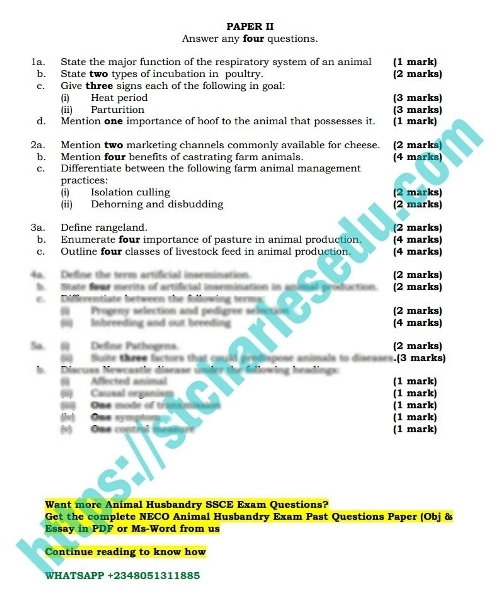
Want more NECO Animal Husb Essay Questions like this?
Get the Complete NECO Exam Questions (Obj and Essay) in PDF Format from us.
Download NECO Animal Husbandry Past Questions and Answers
Click to Download your Free NECO Past Question on Animal Husbandry Paper 2 and 3
Link 1: SSCE NECO Past Question on Animal Husbandry
Link 2: SSCE NECO Past Question on Animal Husbandry
How to Get NECO Questions on Anim Husb.
Take Action
Call or whatsapp us on 08051311885 for the account number to make payment and how to received your complete copy of the past questions to be sent directly to your email address or whatsapp number.
Mode of Payment.
Mobile Transfer or Direct Bank Deposit.
After Payment
send us the following
Depositor Name:
Name of Product Paid for:
Valid email address.
DELIVERY ASSURANCE
We will deliver the past question to you 10 mins after confirmation of payment to the email you will send to us.
